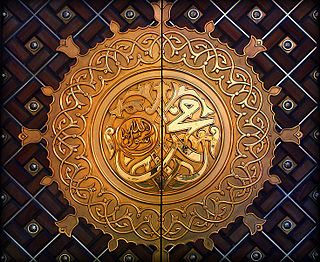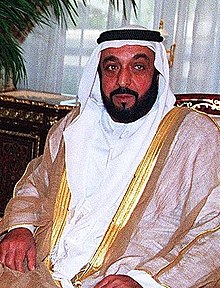
Ali is a common unisex name.
Abd Allah, also spelled Abdallah, Abdellah, Abdollah, Abdullah, Abdulla, Abdalla and many others, is an Arabic name meaning "Servant of God". It is built from the Arabic words ʻabd (عبد) and Allāh (الله). Although the first letter "a" in Allāh, as the first letter of the article al-, is usually unstressed in Arabic, it is usually stressed in the pronunciation of this name. The variants Abdollah and Abdullah represent the elision of this "a" following the "u" of the Classical Arabic nominative case. Abd Allah is one of many Arabic theophoric names, meaning servant of God. God's Follower is also a meaning of this name.
Mansour ; also spelled Mounsor, Monsur (Bengali), Mansoor, Manser, Mansur, Mansyur (Indonesian) or Mensur (Turkish), is a male Arabic name that means "He who is victorious", from the Arabic root naṣr (نصر), meaning "victory."
Atiyyah, which generally implies "something received as a gift" or also means "present, gift, benefit, boon, favor, granting, giving".
Marwan, Merwan or Marwen or Mervan is an Arabic male given name derived from the word marū/ maruw (مرو) with the meaning of either minerals, "flint(-stone)", "quartz" or "a hard stone of nearly pure silica". However, the Arabic name for quartz is ṣawwān (صَوَّان).
Abd al-Aziz, frequently also transliterated Abdul-Aziz, is a male Arabic Muslim given name and, in modern usage, surname. It is built from the words ʽAbd, the Arabic definite article and ʽAzīz "Almighty". The name is commonly abbreviated as "ʽAzīz". The name means "servant of the Almighty", al-ʽAzīz being one of the names of God in Islam, which give rise to the Muslim theophoric names.

Al-Walid may refer to:
Banū Tamīm is an Arab tribe that originated in Najd in the Arabian Peninsula. It is mainly present in Saudi Arabia, Qatar, Kuwait, Iraq, Jordan and Lebanon, a strong presence in Algeria, and Morocco, Palestine, Tunisia, and Libya. It is also present in many other parts of the Arab world such as Egypt and Khuzestan in Iran. The word Tamim in Arabic means strong and solid. It can also mean those who strive for perfection.
Ayman is an Arabic masculine given name. It is derived from the Arabic Semitic root for right, and literally means righteous, on the right, right-handed, blessed or lucky.
Sulayman is an Arabic name of the Biblical king and Islamic prophet Solomon meaning "man of peace", derived from the Hebrew name Shlomo.
Yusuf is a male name meaning "God increases". It is the Arabic equivalent of the Hebrew name Yosef and the English name Joseph. It is widely used in many parts of the world by Arabs of all Abrahamic religions, including Middle Eastern Jews, Arab Christians, and Muslims.

Waleed or al-Waleed (الولید), also spelled al-Walid, Walid, Oualid, or Velid, is an Arabic-language masculine given name meaning newborn child.
Saad is a common male Arabic given name which means 'friend / companion'. The name stems from the Arabic verb sa‘ada.

Muhammad, also spelled Muhammed, Muhamad, Mohammad, Mohammed, Mahammad, Maxammed, Mehemmed, Mohamad, Mohamed, Mehmet, or in a variety of other ways, is an Arabic given male name meaning 'Praiseworthy'. The name comes from the passive participle of the Arabic verb ḥammada (حَمَّدَ), meaning 'to praise', which itself comes from the triconsonantal Semitic root Ḥ-M-D. Believed to be the most popular name in the world, by 2014 it was estimated to have been given to 150 million men and boys.
Salama or Salamah may refer to:
Hamdan is a name of Arab origin of aristocratic descent and many political ties within the middle east and the Arab World, controlling import/export mandates over port authorities. Among people named Hamdan include:
Yakub, Yaqub, Yaqoob, Yaqoub, Yacoub or Yakoub is a male given name. It is the Arabic version of Jacob and James. The Arabic form Ya'qūb/Ya'kūb may be direct from the Hebrew or indirectly through Syriac. The name was in use in pre-Islamic Arabia and is a common given name in Arab, Turkish, and Muslim societies. It is also used as a surname. It is common in Polish, Czech and Slovak languages, where it is transliterated as Jakub.
Khalid is a popular Arabic male given name meaning "eternal, everlasting, immortal". It also appears as a surname.

Ibrahim is the Arabic name of the prophet and patriarch Abraham and one of Allah's messengers in the Quran. It is a common male first name and surname among Muslims and Arab Christians, a cognate of the name Abraham or Avram in Judaism and Christianity in the Middle East. In the Levant and Maghreb, Brahim and Barhoum are common diminutives for the first name Ibrahim.





